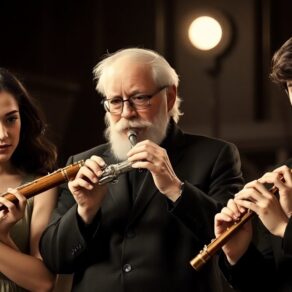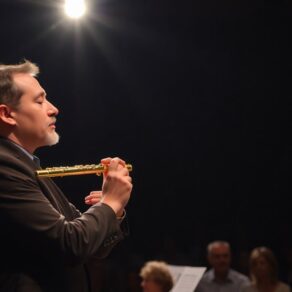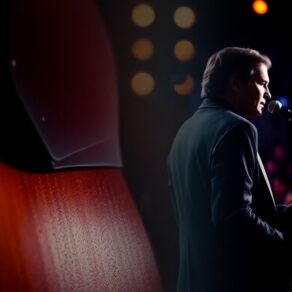You can't overlook the impact of influential flute players like Jean-Pierre Rampal and James Galway, who redefined music by blending genres and pushing artistic boundaries. Rampal's innovations made the flute a prominent solo instrument, while Galway's engaging style has created emotional connections with audiences. Additionally, Claire Chase is transforming contemporary flute performance with her unique soundscapes. Through mentorship, Julius Baker has shaped countless musicians, promoting a holistic approach to flute mastery. These artists not only enhance the repertoire but also foster community and collaboration, enriching the musical landscape. There's even more to explore about their legacies and contributions.
Key Takeaways
- Jean-Pierre Rampal popularized the flute as a solo instrument, expanding its repertoire and setting new standards for sound and expression.
- James Galway blended classical and popular music, redefining the flute's emotional depth and engaging audiences through his charismatic performances.
- Claire Chase pushed the boundaries of contemporary flute performance, creating new soundscapes and enhancing the repertoire through innovative collaborations.
- Julius Baker's holistic approach to flute pedagogy nurtured emotional connections in music, influencing generations of flutists and fostering joy in learning.
- The collaborative efforts of these artists have reshaped traditional flute music, breaking down genre barriers and promoting inclusivity within musical communities.
Jean-Pierre Rampal
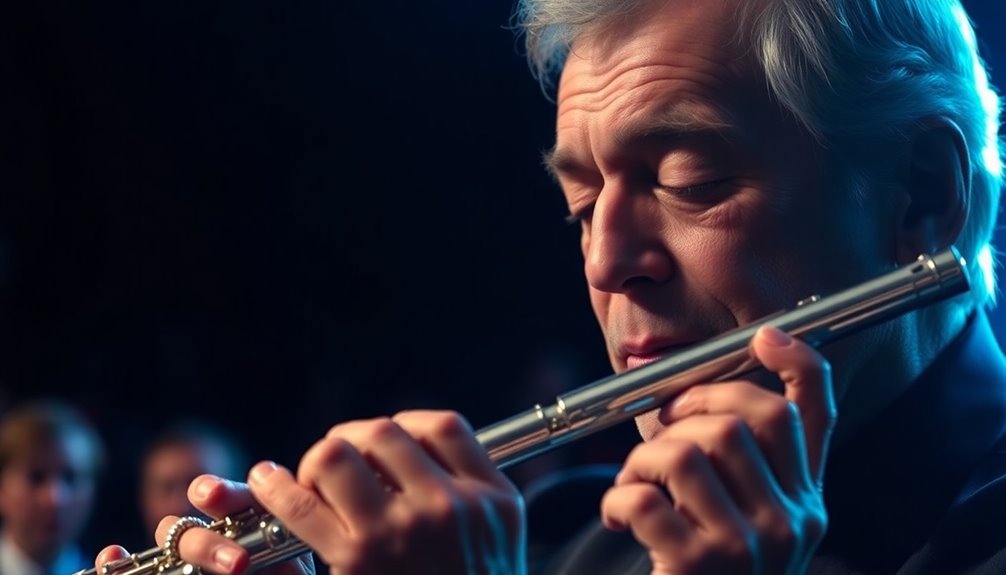
When you think of influential flute players, Jean-Pierre Rampal indisputably stands out as a transformative figure in the world of classical music. His remarkable ability not only popularized the flute but also elevated its status within orchestras and as a solo instrument.
You might find it fascinating how Rampal's legacy extends beyond his performances; it lies in the techniques he innovated and the repertoire he introduced, making the flute more accessible to both musicians and audiences alike.
Rampal had an innate talent for blending technical precision with emotional depth. His mastery of flute techniques, such as breath control and articulation, allowed him to produce a sound that was both clear and rich.
You can appreciate how his dynamic phrasing and expressive vibrato captivated listeners, setting a new standard for what flute playing could achieve. This blend of artistry and mastery didn't just influence his contemporaries; it inspired generations of flutists who sought to emulate his style.
Moreover, Rampal's commitment to expanding the flute repertoire brought lesser-known works to light, encouraging composers to write specifically for the instrument.
His collaborations with other musicians and composers further solidified his role as a bridge between classical and contemporary music.
As you explore Rampal's legacy, you'll recognize how his contributions have shaped and enriched the flute's place in the music world, inviting you to embrace the beauty and versatility of this unique instrument. His mastery of articulation techniques influenced countless flutists, emphasizing the importance of clarity and expression in performance.
James Galway
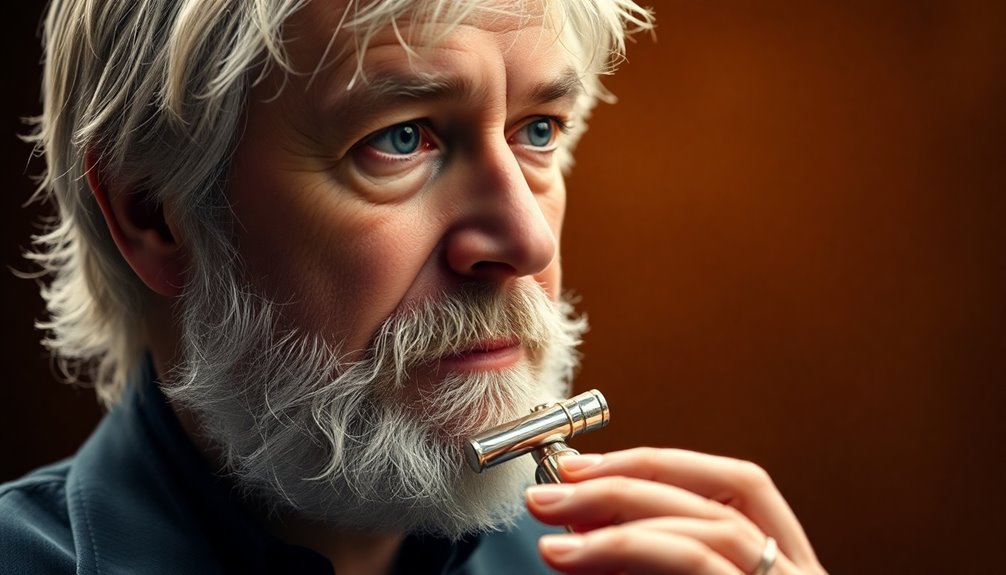
With a distinctive charm and extraordinary talent, James Galway has carved out a remarkable niche for himself in the world of flute playing. Known for his breathtaking performances, Galway's technique combines precision with expressiveness, enchanting audiences worldwide. His influence is further exemplified by the way he showcases the flute's ability to convey emotional depth, a characteristic often highlighted in great flute compositions.
You can see how he's influenced the flute community and beyond, creating a legacy that resonates with both aspiring musicians and seasoned professionals.
Here are three key aspects of Galway's impact:
- Innovative Style: Galway's ability to blend classical and popular music has opened doors for flutists everywhere. His arrangements often incorporate elements from various genres, encouraging you to explore diverse musical landscapes.
- Performance Presence: One of the most compelling traits of Galway's artistry is his stage presence. He engages with his audience, making each performance feel personal and inviting. You can feel the connection he fosters, drawing you into the music.
- Educational Contribution: Galway's commitment to teaching and mentoring has greatly shaped the next generation of flutists. He often shares insights into his technique, making his approach accessible to learners at all levels.
Ultimately, Galway's legacy isn't just about his recordings or accolades; it's about how he's redefined flute playing itself.
Sir James Galway
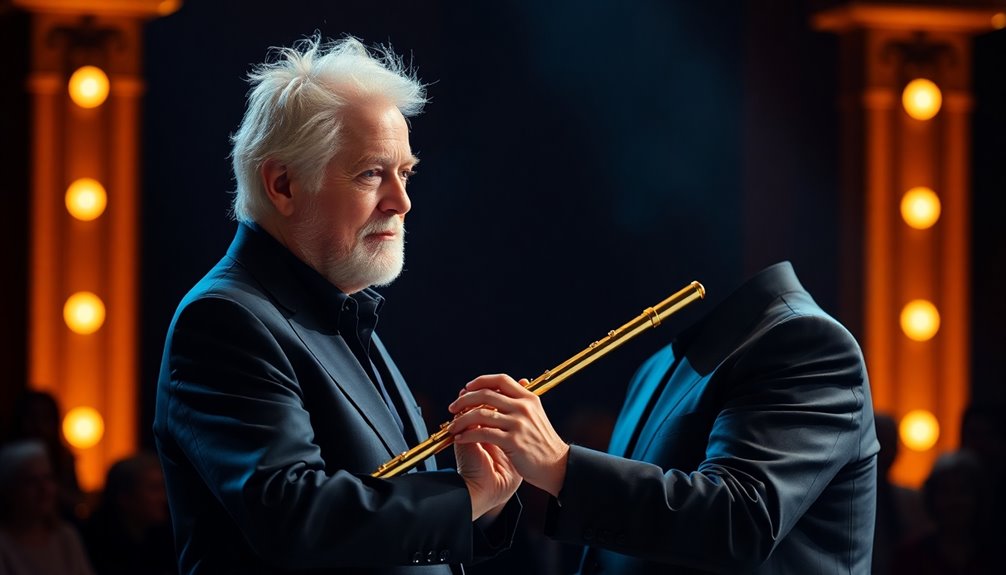
Sir James Galway stands as a towering figure in the domain of flute performance, blending artistry with a profound understanding of music's emotional depth. When you listen to him play, you quickly realize that Galway's technique isn't just about precision; it's a heartfelt expression that resonates with listeners. His ability to navigate complex passages with ease and grace invites you to explore the very essence of the music.
Galway's legacy extends far beyond his impressive discography. He's redefined the role of the flute in both classical and popular music, making it accessible and appealing to a broader audience. You can feel his influence in the way flute players today approach their art, embracing both technical skill and emotional storytelling. This balance has inspired countless musicians to push boundaries, ensuring that the flute remains a vibrant voice in diverse musical landscapes.
Moreover, Galway's charisma plays a significant role in drawing people into the world of flute music. His engaging performances create an inviting atmosphere, where both seasoned listeners and newcomers feel a sense of belonging. You might find yourself captivated not just by the notes he plays, but by the stories he tells through his instrument. His proficiency in advanced techniques such as circular breathing further exemplifies his dedication to pushing the limits of flute performance.
In a world where music often feels fragmented, Galway unites genres and generations, reminding us of the power of melody and emotion. His contributions continue to inspire, echoing through the halls of music history and inviting you to be part of that legacy.
Julius Baker
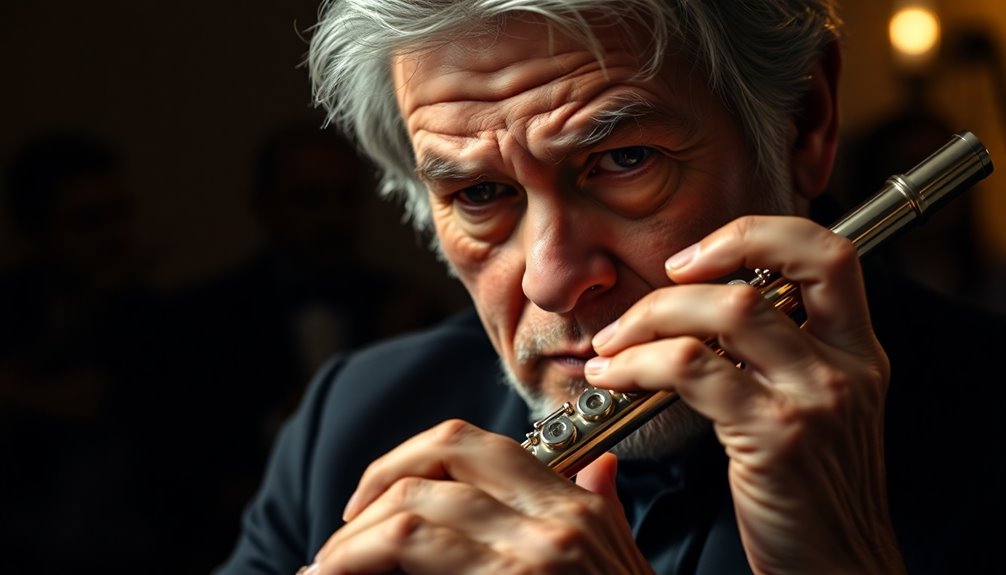
Julius Baker's impact on flute pedagogy and performance is profound, shaping generations of musicians who aspire to master the instrument. His teaching methods resonate with countless flutists, emphasizing the importance of technique, expression, and musicality. You can see Baker's influence in the way students approach their practice, blending discipline with creativity.
Here are three key aspects of Julius Baker's pedagogy that stand out:
- Holistic Approach: Baker believed in nurturing not just technical skills but also the emotional connection to music. He encouraged students to express themselves authentically, fostering a sense of belonging in the musical community.
- Innovative Techniques: His incorporation of various techniques, such as breath control and vibrato, has become foundational for many flutists. You might find that these elements are essential for developing your unique sound and style, especially as they relate to advanced flute techniques.
- Mentorship and Legacy: Baker's dedication to teaching extended beyond the classroom. He mentored numerous successful flutists, ensuring that his impact would echo through the generations. By learning from his methods, you're joining a rich lineage of musicians who've embraced his philosophies.
In a world where music often feels competitive, Julius Baker's pedagogy reminds us of the joy and camaraderie that can come from mastering the flute. His teachings not only refine your skills but also inspire a profound appreciation for the art of music-making.
Embracing Baker's impact, you can find your own voice within the beautiful tapestry of flute performance.
Claire Chase
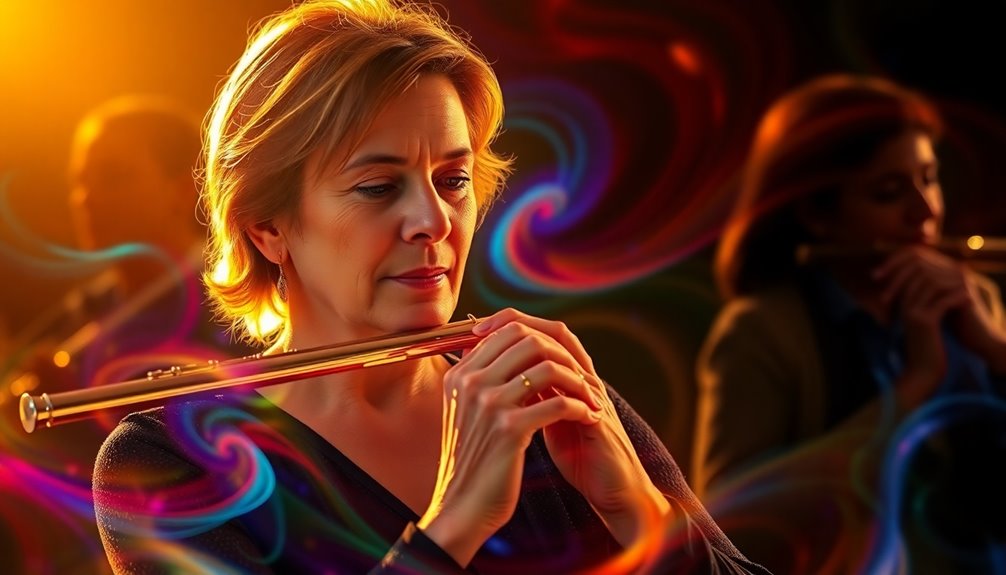
Amid the evolving landscape of contemporary flute performance, Claire Chase stands out as a pioneering force. You can't help but admire her ability to push boundaries and redefine what the flute can achieve. Through her mastery of contemporary techniques, she's opened doors to new soundscapes that resonate deeply with both musicians and listeners alike.
It's not just about playing notes; it's about creating a dialogue through sound, inviting you to experience music in a whole new way.
Chase's innovative collaborations have further cemented her place in the modern music scene. By working with composers from diverse backgrounds, she's brought fresh perspectives to the flute repertoire.
It's this blend of tradition and innovation that truly sets her apart. You'll find her performance not just as a solo act but as part of a collective, weaving in and out of different genres and styles. This approach fosters a sense of community, reminding us that music isn't just an individual pursuit but a shared experience.
When you listen to Chase, you're not merely hearing her play; you're engaging with a vision that includes you. Her commitment to education and mentorship also highlights her belief in nurturing the next generation of flutists. With her emphasis on breath control techniques, she empowers her students to develop their unique sound and expression.
In a world that often feels divided, Claire Chase's artistry brings people together, creating a space where everyone can belong. Ultimately, she's not just redefining flute performance; she's reshaping the very essence of musical collaboration, making it an inclusive journey for all.
Frequently Asked Questions
What Are the Signature Techniques of These Influential Flute Players?
When exploring signature techniques, you'll notice that many players employ extended techniques and unique improvisational styles.
These methods allow you to push the boundaries of traditional flute playing, creating new textures and soundscapes. By incorporating multiphonics or circular breathing, you can add depth to your performances.
Embracing improvisation can also transform your musical expression, connecting you with your audience on a deeper level, fostering a sense of belonging within the musical community.
How Did These Musicians Influence Flute Teaching Methods?
These musicians revolutionized flute teaching methods through their pedagogical innovations and unique teaching philosophies.
You'll notice they emphasized creativity, encouraging students to explore their personal expression.
Their approaches often included a blend of traditional techniques with modern concepts, making lessons more relatable and engaging.
What Genres Did These Flute Players Explore Beyond Classical Music?
You'll find that many flute players venture beyond classical music, diving into genres like jazz improvisation and world fusion.
Their exploration enriches the flute's voice, allowing it to adapt and resonate within diverse musical landscapes.
By incorporating elements from various cultures and styles, they create a unique sound that invites listeners to experience something new.
This blending of genres not only broadens your appreciation but also fosters a sense of belonging in the global music community.
Are There Any Notable Collaborations Among These Artists?
When it comes to collaborations, you really can't judge a book by its cover. Many artists engage in collaborative projects that showcase genre fusion, blending sounds in unexpected ways.
These partnerships often lead to innovative music that transcends traditional boundaries, inviting listeners to explore new auditory experiences.
You'll find that by working together, these musicians create a sense of belonging within diverse communities, enriching the musical landscape for everyone involved.
What Impact Did Technology Have on Their Music Careers?
Technology's transformed music careers in countless ways.
With digital recording, you can create high-quality tracks from home, making it easier to share your unique sound.
Social media platforms allow you to connect directly with fans, building a community around your music.
You're not just an artist; you're part of a larger conversation.
Embracing these tools can elevate your presence and influence, helping you find your place in the ever-evolving music landscape.
Conclusion
As you explore the legacies of these groundbreaking flute players, you'll find that their contributions transcend mere notes and melodies. Each artist, with their unique flair, has gently nudged the boundaries of music, inviting listeners into a world where the flute sings with unparalleled expression. Their influence, like a soft breeze, continues to inspire new generations of musicians, proving that the language of the flute is as timeless as it is transformative. Embrace their stories, and let the music flow.


